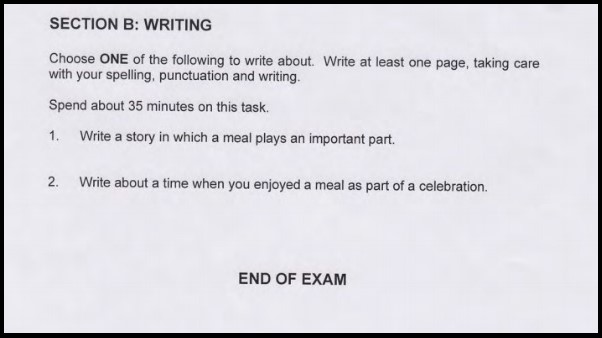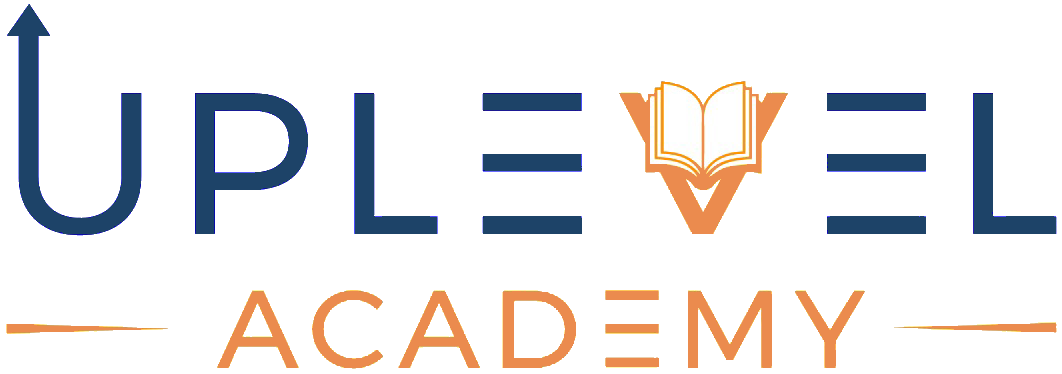In this blog and vlog, we are going to explore:
- What exactly an “optional question” is in an exam;
- Why are students unsuccessful when they choose their own questions;
- How to empower your child to select questions that are right for them;
After reading this blog and watching the video, you will be able to support your child in confidently choosing questions that they will not only be able to answer, but will showcase their true abilities, earning them the grade they truly deserve.
Overview
Due to COVID-19, OFQUAL are considering offering more optional exam questions for Geography, History and Ancient Studies. The idea is to give students more choice in their exams. By doing this, students can choose questions that they can answer successfully – in theory!
Even without the suggested exam changes, children are currently faced with optional exam questions, as shown below:
Examples of GCSE-style questions: 4
You are going to enter a competition.
Either: Write a description suggested by the picture:
Or: Write a story that begins with the sentence: ‘The fog smothered the entire landscape, creating a deafening silence.’


Even young children are expected to use decision-making skills in their exams.
Examples from 11+ papers

Both questions seem similar, yet the way the question is asked is different.

You would think that having choice would make it easier for students to choose questions that they can easily answer. Yet, research has shown that when presented with options in exams, students choose questions they think they will perform well in; however, in reality, they often choose unsuccessfully. Why is this?
Before we answer why students often do not select successfully the best questions for themselves in optional exam questions, it is first imperative to examine what are “optional questions” in exams.
1. What exactly an “optional question” is in an exam.
Now, technically an exam is one big “optional question” in that not all course material is covered in an assessment. Exam boards will create questions based on the course content, but inevitably some elements will not be covered. Students are therefore expected to answer all the questions that come up. To do this, they will need to revise all the material.
With “optional questions”, it means that students do not have to answer all the questions. Instead, they can choose a question that they feel they will answer better.
For example, these questions are from the AQA GCSE History Paper:
Section B
Answer either Question 2 or Question 3 which begins on page 18.
Question 2 The Nazi Rise to Power
2 (a) Why was the Munich Putsch important? [4 marks]
2 (b) Study Source F in the Sources Booklet. Using Source F and your knowledge, explain why the Weimar governments became unpopular before 1924. [8 marks]
2 (c) ‘The main reason Germans voted for the Nazis was because of the economic Depression.’ How far do you agree with this interpretation of why so many Germans voted for the Nazi party in the years 1930 to 1932?
Explain your answer. [12 marks] [SPaG 4 marks]
Question 3 Culture and Propaganda 3
(a) Why was Weimar culture important? [4 marks]
3 (b) Study Source G in the Sources Booklet. Using Source G and your knowledge, explain the cult of the Führer. [8 marks]
3 (c) ‘Nazi propaganda was most successful in entertainment and the arts.’ How far do you agree with this interpretation of the success of Nazi propaganda in the culture of Germany after 1933?
Explain your answer. [12 marks] [SPaG 4 marks]
For these questions, you can see that the style of the questions are the same. They both begin with ‘Why’ questions, then move on to ‘Study’ sources, culminating to an evaluating-style question “How far do you agree”. Therefore, on the face of it, students should be able to decide what question suits them best, as it surely would depend on on the content. Question 2 is about ‘The Nazi Rise to Power’, while question 3 is about ‘Culture Propaganda’, so students need to only choose the topic they know best – simple. But, is it?
Remember, students are in timed exam conditions. Thus, the pressure is on! Students need to make a swift decision to ensure they are able to answer the questions fully. Therefore, students might be swayed by the topic they enjoy. Yet, enjoyment of a topic does not necessarily mean they will do better in that question. Furthermore, it depends on the sources. How well can the students obtain information from the given source to answer the question. They may like the topic in question 2, but may be able to ‘read’ the source in question 3 better.
2. Why are students unsuccessful when they choose their own questions.
We can see that choosing a question in “optional questions” in exams, requires more than simply choosing a topic that the student knows best. Instead, to successfully select a question from the options, students will need the following skills:
- Being able to assess the level of the question: some questions are ‘easier’ to answer than others;
- Being able to evaluate what the question is asking them;
- Being aware of their own abilities and knowledge.
3. How to empower your child to select questions that are right for them.
Knowing the skills required for the “optional questions”, empowers you to create opportunities for your child to exercise these skills, so they are able to apply them in the exam. How can you do this?
Let’s break down the skills required to successfully choose in “optional questions”, and see how you can nurture this in your child.
The ability to assess the difficulty of a question.
First of all, get into your child’s or teenager’s world. By that I mean, what do they enjoy? If they enjoy reading, encourage them to notice differences between books they were reading a year ago to now. How do they know the level is different? They may notice the vocabulary is more challenging. Perhaps they notice the themes are more mature.
If your child enjoys video games, ask them what are the differences in the difficulty modes. How do they know if it is on an easier setting? They may notice the style of game play is different. Or, they may observe the number of villains in the game.
Perhaps your child loves to cook. You can ask them to look at different recipes. Some recipes are considered ‘easy’, while others are considered more ‘difficult’. Ask your child why they think the recipes are given the label ‘easy’ or ‘difficult’. They may think the difficulty of the recipe is determined by the number of ingredients needed for the dish. Alternatively, they may believe it is because of what is required in the preparation of the ingredients.
By encouraging your child or teen to assess things in real life, they will be able to put the skill to their work. You can further bridge the gap by looking over old school work; or, work that is below their age. For instance, if your child is sitting the 11+, have them look at 7+ exam questions. If your teenager is about to sit their GCSEs, have them look at the old KS3 SAT papers. Encourage your child/teenager to notice the differences between the papers. Also ask your child/teenager to look for similarities. How are they similar? By doing this, it engages them critically, so that they deepen their understanding of what is required of them.
To further help your child, especially at GCSE level, ask your child to compare the Foundation and Higher tier papers in the core subjects. Go through the Mark Schemes, as well as the question paper. That way they can see what is expected of them. This helps your teen regardless of whether they are sitting Foundation or Higher tier, since the skill of assessing the question is required in both papers. It will not only serve them for the “Optional questions”, but it will also help them with their core questions, since the paper becomes increasingly more challenging. They will thus have a better understanding of what to expect and how to answer questions.
The ability to evaluate what the question is asking them.
To help your child better understand what the question is asking them, it is useful to become familiar with the Exam Boards ‘Command Words’. These are words used in exams.
If you go on the Exam Boards website, they will have a glossary of their key words.
Here are some examples:
AQA
Art and Design
https://www.aqa.org.uk/resources/art-and-design/gcse/art-and-design/teach/command-words
[Accessed 13/07/2020 at 21:45 hrs]
English
https://www.aqa.org.uk/resources/english/gcse/english-language-8700/teach/command-words
[Accessed 13/07/2020 at 21:46 hrs]
Geography
https://www.aqa.org.uk/resources/geography/gcse/geography/teach/command-words
[Accessed 13/07/2020 at 21:47 hrs]
History
https://filestore.aqa.org.uk/resources/history/AQA-8145-COMMAND-WORDS.PDF
[Accessed 13/07/2020 at 21:39 hrs]
OCR
OCR have an overall guide to their exams:
https://www.ocr.org.uk/Images/570830-guide-to-examinations.pdf
[Accessed 13/07/2020 at 21:59 hrs]
English
https://ocr.org.uk/Images/231995-the-ocr-guide-to-examinations.pdf
[Accessed 13/07/2020 at 21:50 hrs]
Geography
https://www.ocr.org.uk/Images/539424-command-words.pdf
[Accessed 13/07/2020 at 21:52 hrs]
History
https://www.ocr.org.uk/Images/575580-guide-to-assessment-schools-history-project-.pdf
[Accessed 13/07/2020 at 21:55 hrs]
=The ability to know their strengths and weaknesses.
Children and teenagers may not be aware of their strengths and weaknesses as they may not have reflected on their skills. Furthermore, students often relate their ability and aptitude with their enjoyment of a subject. For example, your child may dislike Maths, but be very good at it. Yet, when you ask them if they are good at Maths, they may believe they’re not simply because they do not enjoy the subject.
Moreover, students may believe they are not good at something because it requires a bit more thought. For instance, I have many students tell me they are terrible at creative writing since they find it difficult to get started. Moreover, they think they are terrible writers because they find the prospect of there being no clear ‘right or wrong’ answer, like in Maths or Science, daunting. Nevertheless, despite their protests, when I read their work, I am absolutely delighted at how awfully good it is!
So, how can we encourage children and teens to effectively and accurately reflect on their strengths and weaknesses?
To gain insight into how your teen or child views their abilities, ask them to progressively reflect on a task. By that I mean, if they were doing a Geography case study, for instance, you could ask them to write down what they think they have to do. Then ask them to write down what they think they have to know to answer the question. Once they have done that, ask them to write their answer. Finally, ask your child to rate how they found the task and whether they feel anything is missing.
You could also get your child or teen to self-mark their work. Ask your child or teen to estimate the overall grade they think they have earned. Then, using the mark scheme go over their work with them. See if their marks correspond with the mark scheme. If not, examine where the disparities lie. Was your child/teen too harsh in their judgement? Or, did they consider themselves better than what they currently are in a topic?
Perhaps to make it more interactive, you can ask friends or relatives (of the same age as your child or teen) to peer mark. This enables your child to evaluate and assess how well their friend/relative has performed in an assessment or task. By doing this, they will develop their critical awareness. Moreover, they will also receive feedback, which may help to dispel any false images they have of themselves.
Finally, you can ask your child’s or teen’s teachers to give specific feedback in units in the course content. By doing this, both you and your child or teen, get greater insight into what they need to work on.
Overall
To summarise, “optional questions” in an exam can be highly beneficial to students, if they are familiar with the skills required to successfully choose a question that will enable them to perform their best. It is thus imperative that students develop the following key skills:
- The ability to assess the difficulty of questions;
- The ability to evaluate what the question is asking them;
- The ability to know their strengths and weaknesses.
